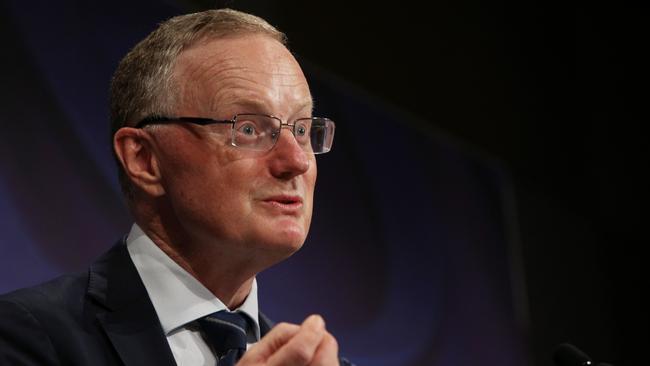Philip Lowe expects inflation to ‘spike higher’ as RBA holds rates at record low of 0.1pc
Philip Lowe says the Ukraine conflict is a ‘major new source of uncertainty’ that will cause inflation to ‘spike higher’ than forecast.

Reserve Bank governor Philip Lowe says the Ukraine war is a “major new source of uncertainty” and predicts inflation will “spike higher” than forecast this year as the conflict drives up fuel costs.
In a statement accompanying the RBA board’s decision on Tuesday to hold rates at a record low of 0.1 per cent, Dr Lowe said climbing oil and gas prices in the wake of the Russian invasion were adding to already intense global inflationary pressures.
“Inflation in parts of the world has increased sharply due to large increases in energy prices and disruptions to supply chains at a time of strong demand. The prices of many commodities have increased further due to the war in Ukraine,” Dr Lowe said. The global benchmark Brent crude oil price was steady at about $US100 a barrel on Wednesday, as traders weighed the risk of further Russian energy export disruptions against talk the US could release strategic oil reserves.
In a report, the Washington-based Institute of International Finance said excluding Russia’s two biggest banks from the international SWIFT payments messaging system – Sberbank and VTB Bank and its subsidiaries – would trigger “a fundamental destabilisation of the entire financial system, with profound implications for the real economy”.
Even more targeted SWIFT sanctions already announced would have “substantial consequences for the Russian banking system and the country’s economy broadly,” the IIF report said.
Dr Lowe said underlying consumer price growth in Australia would lift from 2.6 per cent to peak at 3.25 per cent this year “before declining to around 2.75 per cent over 2023 as the supply-side problems are resolved and consumption patterns normalise”.
He signalled that inflation “will spike higher than this due to the higher petrol prices resulting from global developments”.
“How long it takes to resolve the disruptions to supply chains is an important source of uncertainty regarding the inflation outlook, as are developments in global energy markets,” he said.
Dr Lowe, however, gave no sign that a petrol-powered spike in inflation added impetus to rate hikes. “The board is prepared to be patient as it monitors how the various factors affecting inflation in Australia evolve,” the governor said – the same conclusion that followed the last board meeting.
Economists continued to anticipate a rate hike as early as June, while noting the Ukraine conflict would, at the margin, reinforce the RBA’s patience.
RBC Capital chief economist Su-Lin Ong said “when the RBA is not sure, it tends to sit on the sidelines”. “This would look like a particularly prudent approach at the moment, given the unfolding Russian/Ukraine situation,” Ms Ong said.
Dr Lowe on Tuesday repeated that “while inflation has picked up, it is too early to conclude it is sustainably within the target range”.
“There are uncertainties about how persistent the pick-up in inflation will be, given recent developments in global energy markets and ongoing supply-side problems,” he said.
“At the same time, wages growth remains modest and it is likely to be some time yet before growth in labour costs is at a rate consistent with inflation being sustainably at target.”
Wage growth remained contained at 2.3 per cent over the year to December, despite unemployment dropping to 4.2 per cent.
“Wages growth has picked up but, at the aggregate level, is only around the relatively low rates prevailing before the pandemic,” Dr Lowe said.
“A further pick-up in wages growth and broader measures of labour costs is expected as the labour market tightens. This pick-up is still expected to be only gradual, although there is uncertainty about the behaviour of labour costs at historically low levels of unemployment,” he said.
The RBA forecasts unemployment will reach 3.75 per cent by the end of this year – which would be the lowest rate since 1974.
ANZ senior economist Felicity Emmett said “economists and markets have moved on from the Delta rebound, looked through the shallow Omicron wave and are now focused on mounting inflationary pressure and growth uncertainties”.
December quarter national accounts figures, due on Wednesday, should show a rebound from the Delta disruptions. Economists anticipate real GDP growth of 3.4 per cent over the final three months of last year.








To join the conversation, please log in. Don't have an account? Register
Join the conversation, you are commenting as Logout